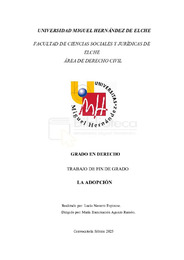Please use this identifier to cite or link to this item:
https://hdl.handle.net/11000/36501Full metadata record
| DC Field | Value | Language |
|---|---|---|
| dc.contributor.advisor | Aganzo Ramón, María Encarnación | - |
| dc.contributor.author | Navarro Espinosa, Lucía | - |
| dc.contributor.other | Departamentos de la UMH::Ciencia Jurídica | es_ES |
| dc.date.accessioned | 2025-04-15T07:39:56Z | - |
| dc.date.available | 2025-04-15T07:39:56Z | - |
| dc.date.created | 2024 | - |
| dc.identifier.uri | https://hdl.handle.net/11000/36501 | - |
| dc.description.abstract | El presente trabajo tiene por objeto analizar el proceso de adopción en su totalidad, tanto a nivel nacional como internacional, desde una perspectiva fundamental: el interés superior del menor, que es lo que debe primar en cualquier decisión que le afecte. Se estudian los aspectos legales del proceso de adopción, tales como la idoneidad de los adoptantes, los consentimientos y asentimientos requeridos, la resolución final y las consecuencias de la irrevocabilidad del proceso. Además, se resalta la complejidad y los desafíos del proceso adoptivo, ligados a los nuevos modelos de familia y a la gestación subrogada. Se analiza la necesidad de la persona adoptada de conocer en su momento sus orígenes biológicos, para lo que se determina cuáles son las obligaciones de la Administración y los derechos del adoptado. Y, finalmente, se insiste en el impacto positivo del proceso de adopción, al permitir que los menores en situación de abandono y vulnerabilidad tengan la oportunidad de crecer en un entorno donde puedan desarrollarse plenamente y ser amados como parte de una familia. | es_ES |
| dc.description.abstract | The purpose of this paper is to analyse the adoption process in its entirety, both nationally and internationally, from a fundamental perspective: the best interests of the child, which must be paramount in any decision affecting him or her. The legal aspects of the adoption process are studied, such as the suitability of the adopters, the consents and assents required, the final decision and the consequences of the irrevocability of the process. It also highlights the complexity and challenges of the adoption process, linked to new family models and surrogacy. The need for the adopted person to know his or her biological origins in due course is analysed, for which the obligations of the Administration and the rights of the adoptee are determined. Finally, the positive impact of the adoption process is emphasised, as it allows children in situations of abandonment and vulnerability to have the opportunity to grow up in an environment where they can develop fully and be loved as part of a family. | es_ES |
| dc.format | application/pdf | es_ES |
| dc.format.extent | 80 | es_ES |
| dc.language.iso | spa | es_ES |
| dc.publisher | Universidad Miguel Hernández de Elche | es_ES |
| dc.rights | info:eu-repo/semantics/openAccess | es_ES |
| dc.rights.uri | http://creativecommons.org/licenses/by-nc-nd/4.0/ | * |
| dc.subject | Adopción | es_ES |
| dc.subject | Interés superior del menor | es_ES |
| dc.subject | Bienestar | es_ES |
| dc.subject | Infancia | es_ES |
| dc.subject | Familia | es_ES |
| dc.subject | Patria potestad | es_ES |
| dc.subject | Derechos del niño | es_ES |
| dc.subject | Desamparo | es_ES |
| dc.subject | Idoneidad | es_ES |
| dc.subject | Tratados internacionales | es_ES |
| dc.subject | Vulnerabilidad | es_ES |
| dc.subject | Adoption | es_ES |
| dc.subject | Best interests of the child | es_ES |
| dc.subject | Welfare | es_ES |
| dc.subject | Childhood | es_ES |
| dc.subject | Family | es_ES |
| dc.subject | Parental authority | es_ES |
| dc.subject | Children's rights | es_ES |
| dc.subject | Abandonment | es_ES |
| dc.subject | Suitability | es_ES |
| dc.subject | International treaties | es_ES |
| dc.subject | Vulnerability | es_ES |
| dc.subject.other | CDU::3 - Ciencias sociales::34 - Derecho | es_ES |
| dc.title | La Adopción | es_ES |
| dc.type | info:eu-repo/semantics/bachelorThesis | es_ES |

View/Open:
TFG-Lucía Navarro Espinosa.pdf
1,31 MB
Adobe PDF
Share:
.png)
